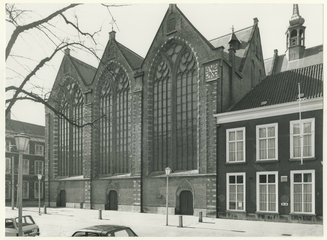
The restrained Kloosterkerk on Lange Voorhout has long been home church of the royal family. But it also played a role in the short life of Jacobus Capitein, a Ghanaian born in 1717 who was kidnapped as a child from Africa's west coast, sold to a captain of the West India Company and finally gifted to a Dutch merchant. Jacobus ended up in The Hague, where he was baptised in the Kloosterkerk in 1735. He then went on to study theology at Leiden, where he defended the thesis that: spiritual slavery was diabolical, but that physical slavery had God's blessing. Of course, the proponents of slavery fully agreed with this, and Capitein was sent as a reformed minister in the service of the W.I.C. to West Africa, where James died after five years at the age of 30.
In retrospect, we see the tragedy of his life in forced cleavage. But he himself may have seen it differently. In any case, this story shows that Bible texts on slavery were interpreted in many ways. By both supporters and opponents, the Bible was used to defend moral choices and justify or justify self-interest.